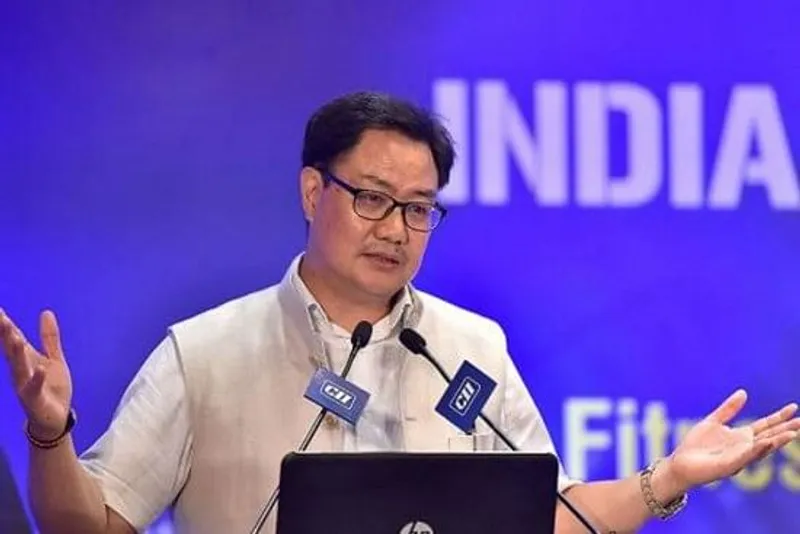Waqf Bill to Empower Poor, Women, and Backward Communities: Rijiju

Waqf Bill Will Empower Low-Income Families, Women, and Marginalized Communities: Rijiju
The Indian government has introduced a major amendment to the Waqf Act, aiming to modernize how Waqf properties are managed. Union Minister Kiren Rijiju emphasized that this move will benefit individuals and families with low income, empower women, and support socially and economically marginalized communities, including certain religious groups, Scheduled Castes (SCs), and Other Backward Classes (OBCs).
In fact, the bill is being described as a step toward social justice, equal opportunity, and inclusive governance.
🕌 What Is Waqf?
To begin with, Waqf refers to a charitable donation under Islamic law. These donations typically take the form of land or property that is set aside permanently for religious, educational, or social purposes.
For example, Waqf properties are often used to support mosques, schools, hospitals, and orphanages. These assets are overseen by Waqf Boards in each state.
However, over the years, poor management, illegal occupation, and lack of transparency have created major roadblocks. As a result, the people these resources were intended to help—including underserved religious communities and economically vulnerable groups—often miss out.
📜 What Does the Waqf (Amendment) Bill Do?
The Waqf (Amendment) Bill, 2023 introduces several key reforms to address long-standing issues and create a more equitable system.
Highlights of the Bill:
- Digital Transparency
The bill mandates that all Waqf records be digitized and publicly accessible. Consequently, this will reduce corruption and allow community members to track how properties are being used. - Inclusive Governance
In addition, it requires better representation of women, Scheduled Castes (SCs), Other Backward Classes (OBCs), and economically disadvantaged religious communities on the Waqf Boards. - Merit-Based Appointments
The bill proposes transparent, merit-based criteria for appointing Waqf Board members, promoting competence over connections. - Legal Safeguards
Furthermore, it strengthens protections to prevent unauthorized occupation of Waqf land and ensures fair usage.
To explore how Waqf assets are managed in India, you can visit the Ministry of Minority Affairs.
🙋 Who Will Benefit From This Reform?
According to Minister Rijiju, the bill is designed to help people who have historically faced exclusion or lacked access to basic services.
1. Families With Low Income
Many Waqf lands are located in areas where services like schools and hospitals are scarce. As a result, utilizing these assets properly can dramatically improve access to essential resources for people living below the poverty threshold.
For instance, a Waqf-funded school or training center in a rural town could create new educational pathways for local youth.
2. Women
The bill actively promotes the inclusion of women in leadership roles within Waqf Boards. Therefore, it opens up opportunities to direct resources toward women-focused initiatives like maternal health, women’s shelters, or skill development.
Moreover, women’s representation can bring fresh perspectives into how community assets are managed.
3. Socially Marginalized Communities
This includes Scheduled Castes (SCs), Other Backward Classes (OBCs), and economically underprivileged members of religious communities. By ensuring their presence on Waqf Boards, the bill aims to make governance more representative and responsive.
Consequently, decisions will be shaped by the needs and experiences of people often left out of policy-making.
🔍 Why Was the Reform Urgently Needed?
India has over 600,000 Waqf properties, many of which are underutilized. However, the lack of clear records and transparency has led to widespread inefficiencies and allegations of misuse.
In addition, communities who depend on Waqf-funded services often face hurdles due to poor planning and exclusion from decision-making roles.
Therefore, the new bill aims to correct these issues by prioritizing transparency, efficiency, and inclusion.
💡 Technology and Transparency
One of the bill’s most important features is digitization. The Waqf Management System of India (WAMSI) is a government portal that allows anyone to view property records, usage history, and governance details.
As a result, this platform gives stakeholders—including the public—direct access to monitor Waqf assets and raise concerns when needed.
You can visit WAMSI here: https://www.wamsi.nic.in/
🗣️ What Kiren Rijiju Said
During a public address, Union Minister Kiren Rijiju stated:
“This amendment is to bring justice to people with low income, to women, and to communities that have long been denied their fair share. We want Waqf properties to serve their true purpose.”
He added that the bill was crafted in consultation with scholars and community leaders to ensure both fairness and respect for religious traditions.
🛑 What Are the Concerns?
Despite the positive goals, some critics worry that the bill may give the government too much control over religious property.
However, supporters argue that the reforms are necessary to ensure accountability and end years of mismanagement.
To address these concerns, the government has promised open consultations with religious leaders, legal experts, and civil society groups.
🌍 A Step Toward Inclusive Growth
Ultimately, the Waqf Amendment Bill is a tool for national development. By improving the governance of Waqf properties, the government can unlock services for education, health, and livelihoods.
Moreover, involving women and underrepresented communities ensures that governance is more inclusive and equitable.
As a result, Waqf assets can finally fulfill their potential as engines of progress for everyone.
✅ Conclusion: Building Justice Through Reform
In conclusion, the Waqf (Amendment) Bill, 2023 marks a turning point in how community assets are managed.
Through digital tools, community inclusion, and legal clarity, the government aims to make Waqf properties more useful, accountable, and equitable.
This bill is not just about managing land—it’s about unlocking opportunity for millions of people who deserve a fair shot at a better future.
🔗 Learn More:






